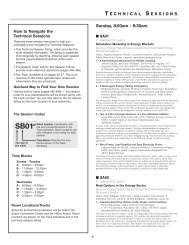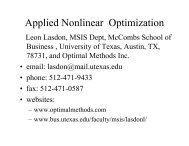Sunday
Sunday
Sunday
Create successful ePaper yourself
Turn your PDF publications into a flip-book with our unique Google optimized e-Paper software.
SA59<br />
■ SA59<br />
59- Phoenix West- Hyatt<br />
Many-server Queues: Approximations and Control<br />
Sponsor: Applied Probability<br />
Sponsored Session<br />
Chair: Itai Gurvich, Northwestern University - Kellogg School of<br />
Management, Evanston, IL, United States of America,<br />
i-gurvich@kellogg.northwestern.edu<br />
1 - Impatience Differentiation in Large-scale Service Systems with<br />
Customer Reentrance<br />
Guodong Pang, Assistant Professor, Pennsylvania State University,<br />
University Park, PA, United States of America, gup3@engr.psu.edu,<br />
Weining Kang<br />
We consider large-scale service systems where customers need to reenter the<br />
system to fulfill their further service requests and the reentry may happen after<br />
some random delay time. We assume that the patience times of new and<br />
reentrant customers may have different distributions. Under mild assumptions on<br />
the general interarrival, service, delay and patience delay times, we investigate the<br />
impact of the impatience differentiation upon the service performance in such<br />
systems.<br />
2 - Staffing and Control for Call Center Outsourcing with Rework<br />
Jiheng Zhang, Hong Kong University of Science and Technology,<br />
Clear Water Bay, Hong Kong, Hong Kong-PRC, j.zhang@ust.hk, Jin<br />
Fang, Eser Kirkizlar<br />
We study a system with both in-house and outsourcer call centers. With certain<br />
probability, customers need to be rerouted to the in-house call center for further<br />
help after receiving service at the outsourcer. The pooling of the two call centers is<br />
allowed. Using a fluid approximation in a heavy traffic regime, we jointly<br />
determine the optimal control rule and the staffing policy that asymptotically<br />
minimize the staffing cost and long run holding cost subject to a service level<br />
constraint.<br />
3 - Non-FCFS Scheduling in Fluid Many-server Queues<br />
Petar Momcilovic, Associate Professor, University of Florida,<br />
303 Weil Hall, P.O. Box 116595, Gainesville, FL, 32611,<br />
United States of America, petar@ise.ufl.edu, Avishai Mandelbaum<br />
We consider non-FCFS scheduling policies in many-server fluid queues. In<br />
particular, we examine time-varying queues under the assumption that the<br />
scheduler knows realizations of customer patience/service times. Implementing a<br />
non-FCFS policy improves the overall system performance in terms of the number<br />
of customers that abandon during overloaded periods.<br />
4 - Scheduling Parallel Servers in the Non-degenerate Slowdown<br />
Diffusion Regime: Asymptotic Optimality<br />
Itai Gurvich, Northwestern University-Kellogg School of<br />
Management, Evanston, IL, United States of America,<br />
i-gurvich@kellogg.northwestern.edu, Rami Atar<br />
We consider the problem of minimizing holding costs in a parallel-server system<br />
operating in a many-server heavy-traffic regime with non-degenerate slowdown<br />
(NDS). The NDS many-server regime is distinct from existing heavy-traffic<br />
regimes. As in the conventional heavy-traffic regime, the asymptotics are captured<br />
by a Brownian control problem, the solution of which exhibits state-space<br />
collapse. We prove an asymptotic lower bound and construct a sequence of<br />
asymptotically optimal policies.<br />
■ SA60<br />
60- Remington- Hyatt<br />
Joint Session RM/Aviation: Robust Airline<br />
Optimization, Alliances and Revenue Sharing<br />
Sponsor: Revenue Management & Pricing & Aviation Applications<br />
Sponsored Session<br />
Chair: Milind Sohoni, Indian School of Business, Gachibowli,<br />
Hyderabad, 500032, India, milind_sohoni@isb.edu<br />
1 - Reducing Flight Delays by Optimizing Block-time Allocation<br />
Mazhar Arikan, University of Kansas, School of Business,<br />
Lawrence, KS, United States of America, mazhar@ku.edu,<br />
Vinayak Deshpande, Milind Sohoni<br />
In this paper, we develop an approach to reallocate block-times across the<br />
network of an airline and analyze the trade-off between total network arrival<br />
delay minutes and network-wide block-time budget based on a stochastic traveltime<br />
model. Using data acquired from a major U.S. airline, we construct an<br />
efficient frontier by optimally allocating block-times while considering target ontime<br />
arrival probability for each flight in the network.<br />
INFORMS Phoenix – 2012<br />
76<br />
2 - Robust Gate Assignment to Reduce Tarmac Waiting Time<br />
Amy Cohn, University of Michigan, Ann Arbor, MI,<br />
United States of America, amycohn@umich.edu, Ryan Chen<br />
We study the problem of assigning flights to gates at an airport, with the goal of<br />
reducing delay associated with an inbound flight waiting on the tarmac because<br />
its gate is still occupied by the preceding outbound flight. This can happen<br />
because the outbound flight is late leaving, the inbound flight is early arriving, or<br />
both. We develop MIP models to assign flights to gates so as to recognize the<br />
inherent stochasticity of the system, and provide empirical analysis based on these<br />
models.<br />
3 - Revenue Sharing in Airline Alliances<br />
Xing Hu, Assistant Professor, University of Oregon, 484 Lillis Hall,<br />
1208 University of Oregon, Eugene, OR, 97401, United States of<br />
America, xingh@uoregon.edu, Rene Caldentey, Gustavo Vulcano<br />
We study codeshare, the practice of independent airlines collaboratively<br />
marketing and operating fights. We propose a two-stage hierarchical approach to<br />
study the revenue sharing rules and decentralized inventory controls from both<br />
cooperative and non-cooperative game approach. Through both analytical and<br />
numerical studies, we find that revenue sharing rule affects the system<br />
significantly. We identify the existence and uniqueness of an admissible and<br />
efficient revenue sharing.<br />
■ SA61<br />
61- Russell- Hyatt<br />
Aviation Support Operations<br />
Sponsor: Aviation Applications<br />
Sponsored Session<br />
Chair: Wenwei Cao, Georgia Institute of Technology, 765 Ferst Dr NW,<br />
Atlanta, GA, United States of America, cww@gatech.edu<br />
1 - Cost Allocation in Fractional Jet Ownership Programs<br />
Wenwei Cao, Georgia Institute of Technology, 765 Ferst Dr NW,<br />
Atlanta, GA, United States of America, cww@gatech.edu, Ozlem<br />
Ergun, Lezhou Zhan, Ellis Johnson<br />
Higher charter and reposition costs have plagued the profitability of the fractional<br />
jet industry since its inception. Incentive programs and pricing adjustments are<br />
introduced to offset these common costs incurred to service the customers. A<br />
central problem in designing these programs is establishing a justifiable cost<br />
allocation scheme. Furthermore, accurate estimates of cost-to-serve are valuable<br />
information to other marketing and operational decisions. In this paper we<br />
develop different mechanisms for the cost allocation problem. The<br />
appropriateness and key trade-offs of the mechanisms are also discussed on the<br />
basis of certain principles of equity and computational performance.<br />
2 - An Integrated Optimal Decision Model for Ground Logistics and<br />
Air Cargo Scheduling<br />
Kwon Gi Mun, PhD Student, Rutgers Business School, #1009B, 1<br />
Washington Park, Newark, NJ, 07102, United States of America,<br />
kwongmun@eden.rutgers.edu<br />
The mathematical model of two-tiered generalized scheduling problem has been<br />
formulated. Thus the optimal assignment solution between airports and facilities<br />
will be computed with the minimum transportation cost at the first stage. And<br />
then the minimum total cost will be calculated with the optimal routing solution<br />
of aircrafts. This research will use a mathematical model with practical constraints<br />
and real data.<br />
■ SA62<br />
62- Borein A - Hyatt<br />
Joint Session Auctions/MSOM: Competitive Sourcing<br />
and Procurement<br />
Cluster: Auctions & Manufacturing & Service Oper Mgmt<br />
Invited Session<br />
Chair: Cuihong Li, University of Connecticut, Storrs, CT, 06269,<br />
United States of America, cli@business.uconn.edu<br />
1 - Incentive Functions for Transportation Procurement Auctions<br />
Diwakar Gupta, University of Minnesota, 111 Church Street S. E.,<br />
Minneapolis, MN, 55455, United States of America,<br />
guptad@me.umn.edu, Justin Azadivar, Yibin Chen<br />
State Transportation Agencies (STAs) use variants of the first-price sealed-bid<br />
auction mechanism to realize low cost, high quality, and fast completion of<br />
highway and bridge construction projects. STAs pay incentives based on the<br />
realized value of an attribute of the work, which may or may not be of value, but<br />
bids do not explicitly include this attribute. We present models to identify costminimizing<br />
incentive functions for agencies, net of any benefits that may accrue<br />
from the attribute.



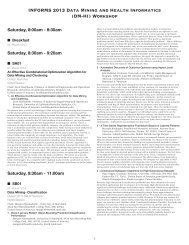
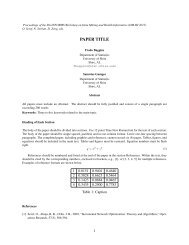
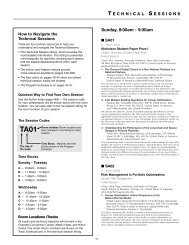
![[PDF] Charlotte Back Matter](https://img.yumpu.com/17933057/1/190x245/pdf-charlotte-back-matter.jpg?quality=85)
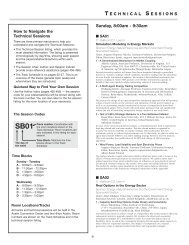
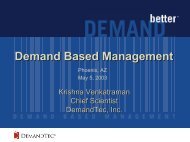
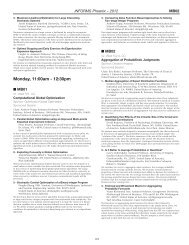
![[PDF] ALIO Back Matter](https://img.yumpu.com/17932960/1/190x245/pdf-alio-back-matter.jpg?quality=85)
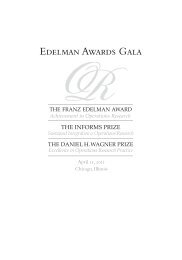
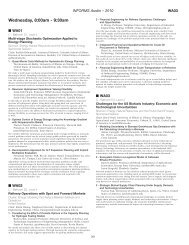
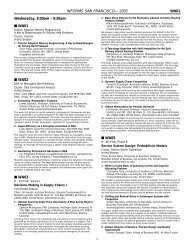
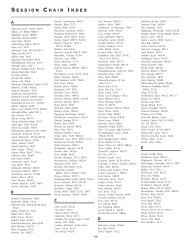
![[PDF] Monday, 8:00am - 9:30am](https://img.yumpu.com/17932954/1/190x245/pdf-monday-800am-930am.jpg?quality=85)
